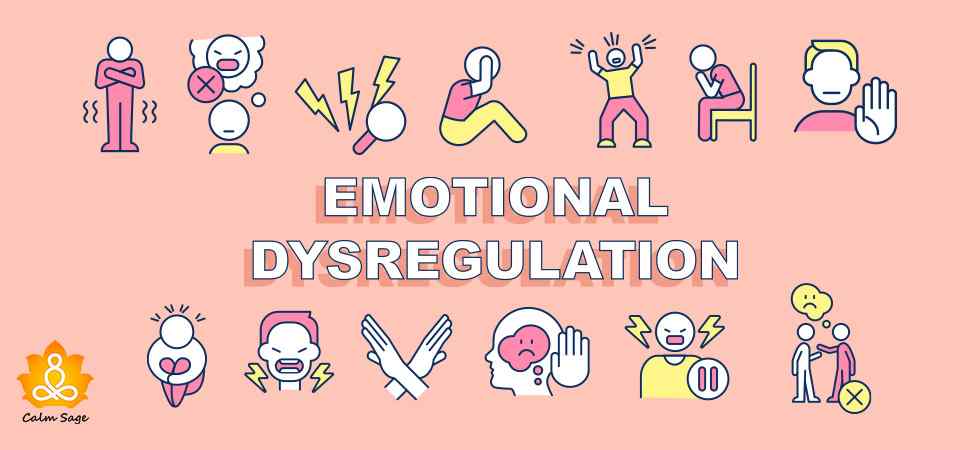All You Need To Know About Emotional Dysregulation

Are you someone who’s not able to control their emotions or emotional responses no matter how much you try to gain control over them? In psychology, we refer to this as “dysregulation” or “emotional dysregulation.” Emotional dysregulation happens when someone is not able to control their emotional responses as a result, it can lead to emotional lability, extreme mood swings, and challenging emotions such as frustration, irritability, sadness, or anger. Dysregulation can directly impact regular life, work, school, and relationships.
Dysregulation is not a specific mental health disorder but if the persisting issues are not resolved before time, they can develop into major mental health issues. Keep reading this blog to know more about dysregulation, its types, impacts, related mental health disorders, and more.
This blog covers:
- What is Emotional Dysregulation?
- Characteristics of Dysregulation
- Examples of Dysregulation
- Types of Dysregulations
- Symptoms of Dysregulation
- Related Mental Health Issues to Dysregulation
- Impacts of Dysregulation
- Causes of Dysregulation
- Diagnosis and Treatment of Dysregulation
- Quick and Effective Tips to Overcome Emotional Dysregulation
- Parenting a Child with Emotional Dysregulation
- Key Points: Emotional Dysregulation
What is Emotional Dysregulation?
Emotional dysregulation is a mental health condition that affects the ability to control or manage emotions. This condition is quite common in children and adolescents. If not managed or controlled over time, this condition can also show its major impacts in adulthood. People struggling with emotional dysregulation have trouble regulating their emotions which often results in self-damaging behaviors, anxiety, angry outbursts, or depression.
Eventually, this condition impacts the overall quality of life, personal life, relationships, work-life, and social interactions. Emotional dysregulation is not a specific mental health condition but it can be an important factor in other mental health conditions such as borderline personality disorder (BPD), attention deficit hyperactivity disorder (ADHD), emotional lability, and more.
Here are some common characteristics of dysregulation:
- Difficulty in cognitive reconsideration
- Emotional rigidness
- Inability to express or experience emotions
- Insufficient emotional reactivity
- Reduced emotional awareness
Here are some common examples of emotional dysregulation:
- Inability to steer emotions or moods especially negative emotions such as stress, anxiety, and others.
- Becoming easily frustrated or annoyed with little things
- Impulsivity towards little inconveniences in life
- Hypomania or manic episode
- Being prone to depression, emotional or anger outbursts
Types of Dysregulations
In psychology, there are different types of dysregulations, such as:
1.Affect Dysregulation
Affect is a term used for consistent or unilateral feelings. This term is almost used by everyone to express the level of emotion, affect, and mood. Affect dysregulation is used for determining an outward expression of feelings. People struggling with affect dysregulation are not able to recognize the right cues and they often end up displaying inappropriate responses such as smiling during sad situations.
2.Autonomic Dysregulation
Autonomic dysregulation is related to the autonomic nervous system (ANS) which is responsible for controlling our major body functions. In cases of autonomic dysregulation, the body stops or starts incorrectly regulating body functions. This type of dysregulation often results in trauma or the development of disorders such as ADHD.
3.Behavioral Dysregulation
Behavioral dysregulation is known as the difficulty in controlling or regulating behaviors. For example, people struggling with obsessive-compulsive disorder (OCD) are not able to address their emotions which results in excessive feelings of sadness, self-harm, substance or alcohol abuse, or binge eating. This type of dysregulation can also be commonly seen in the cases of autism spectrum disorder or ADHD.
4.Cortisol Dysregulation
Cortisol is a neurochemical responsible for increased stress. Cortisol dysregulation happens when the body does not reduce the production of cortisol even when the challenging situations have passed. It can also lead to fatigue, extreme mood swings, skin changes, weight loss, and more.
Symptoms of Dysregulation
Below listed are some of the common signs of dysregulation:
- Anxiety
- Depression
- Emotional numbness
- Excessive feelings of sadness, undefined fear, or anger
- Experiencing intense emotions which are not easy to express or control
- Excessive substance use
- Extreme mood swings
- Feeling guilty about emotions
- Feeling overwhelmed
- Impulsive behavior
- Inability to manage or control behavior
- Self-harm
- Strong or intense emotional reactions to situations wherein others might have reacted normally or looked normal to others
- Trouble recognizing emotions
- Unable to cope with stress
Here are some common signs of emotional dysregulation in children:
- Anger outbursts
- Crying
- Excessive tantrums or fuzziness
- Inability to speak properly or maintain eye contact with parents or caregivers
- Undefined temper
Related Mental Health Issues to Dysregulation
Below are some mental health disorders that involve dysregulation:
- Anxiety disorders
- Attachment issues
- Attention deficit hyperactivity disorder (ADHD)
- Autism spectrum disorder (ASD)
- Borderline personality disorder (BPD)
- Bipolar disorder
- Complex-PTSD (C-PTSD)
- Disruptive mood dysregulation disorder (DMDD)
- Fetal alcohol syndrome (FAS)
- Mood disorders such as depression
- Obsessive-compulsive disorder (OCD)
- Panic disorder
- Post-traumatic stress disorder (PTSD)
- Trauma
Impacts of Dysregulation
The inability to express, manage, or control your emotions can affect the overall quality of life and additionally, it can have a range of negative impacts on life such as:
- Difficulty resolving conflict
- Negative impacts on your school, work, or social life
- Prone to developing a mental health disorder due to the inability to regulate your emotions such as depression, ADHD, and more
- Prone to developing substance abuse problems such as binge drinking, smoking, and others
- Prone to engagement in self-harm or restrictive behaviors such as binge eating
- Ruined relationships due to heated arguments or discussions that blow out into anger
- Trouble falling asleep
- Trouble concentrating
- Trouble letting go or you might start holding grudges for a longer period
Causes of Dysregulation
It’s quite challenging to find the exact cause of emotional dysregulation, however, research shows that there could be many factors that can cause dysregulation. Early psychological trauma in the form of abuse or neglect from parents can also result in emotional dysregulation. In some cases, it also takes the form of reactive attachment disorder as people struggle to balance their emotions or model healthy coping skills.
Additionally, research shows that people with mental health conditions are also prone to develop emotional dysregulation as they lack self-control. Moreover, people with different brain functioning are also prone to developing this condition.
Diagnosis and Treatment of Dysregulation
If you think you or your loved one might be struggling with emotional dysregulation, you must watch out for severe symptoms such as:
- Verbal outbursts
- Aggressive or violent behavior
- Trouble maintaining a professional or personal life
If the symptoms disrupt everyday functioning, professional, or personal life severely, you must connect with a mental health provider for diagnosis and treatment. Since there can be the presence of other mental health conditions as well, this is why, proper screening and diagnosis by an experienced and registered mental health professional plays an important role.
To connect with a mental health professional through online platforms, refer to:

Great for a large network of licensed therapists
-
$60 to $90/week, billed every 4 weeks
-
Therapy via messaging, phone, or live video chat
-
Flexible cancellation at any time
20% off your first month

Great for CBT Based therapists
-
$40/week, billed every 4 weeks
-
Therapy via messaging, phone, or live video chat
-
Specialization for CBT based Therapy
20% off your first month

Best for Treatment Plants
-
$60 to $90/week, billed every 4 weeks
-
Therapy via messaging, phone, or live video chat
-
Flexible cancellation at any time
$100 off your first month with code SPACE
Coming forth to the treatment of dysregulation, generally, there are two main options for treating dysregulation, medication, and therapy. Let’s take a look at both of the treatment options:
Medications
Medications such as antidepressants, stimulating, and antipsychotics are generally prescribed to treat some specific symptoms such as anger, depression, anxiety, and more.
Therapy
-
Cognitive Behavioral Therapy (CBT)
CBT is generally prescribed for replacing negative thoughts with positive ones and to treat healthy and practical coping skills. CBT also helps in identifying negative behaviors, beliefs, self-perceptions, and more.
-
Dialectical Behavioral Therapy (DBT)
DBT is a form of CBT that is more patient-centric as it helps in targeting challenging emotions and teaches healthy coping skills for reactions and feelings.
Quick and Effective Self-Help Tips to Overcome Emotional Dysregulation
Along with therapy, you can refer to the below-listed effective self-help tips to manage dysregulation:
- Journal your feelings so that you can gain a better perspective towards your emotions and improve emotional regulation.
- Try mindful meditation or yoga to strengthen your mind and soul so that you can express your emotions and feelings effectively.
- Practice gratitude every day for positive reinforcements and build meaningful relationships with yourself and your loved ones.
- Try deep breathing exercises for calming your emotions and understanding your core beliefs.
- Stick to a healthy eating and sleeping routine for improved everyday functioning.
Parenting a Child with Emotional Dysregulation
If you’re a parent with an emotionally dysregulated child, you can support your children with the help and guidance of a mental health professional. Apart from therapy, you can try the below-mentioned tips to parent a child with emotional dysregulation:
- While parenting them, always take the help of real-life examples so that they can learn and understand with real-life examples.
- Recognize their symptoms and triggers so that you can always help them with practical strategies and coping skills.
- Instead of punishing them, make them learn so that they can build resilience as well.
- Maintain consistent sleeping and eating routines so that they can understand their needs and act accordingly.
- Reward positive behaviors so that they can understand their emotions and become more frequent with that.
- Be easy on them and yourself as well so that you both can manage the distress that comes along with the process.
Key Points: Emotional Dysregulation
- Emotional dysregulation is a mental health condition that affects the ability to control or manage emotions. This condition is quite common in children and adolescents.
- Anxiety, depression, emotional numbness, excessive feelings of sadness, undefined fear, or anger are some of the common symptoms of emotional dysregulation.
- The inability to express, manage, or control your emotions can affect the overall quality of life.
- Early psychological trauma in the form of abuse or neglect from parents can also result in emotional dysregulation. In some cases, it also takes the form of reactive attachment disorder as people struggle to balance their emotions or model healthy coping skills.
- Generally, there are two main options for treating dysregulation, medication, and therapy.
I hope this blog helps you understand everything you wanted to know about emotional dysregulation or dysregulation.
Comment down and share your queries or you can also write us at calmsage.
For more such content, connect with us through all social media platforms.
Thanks for reading!




















